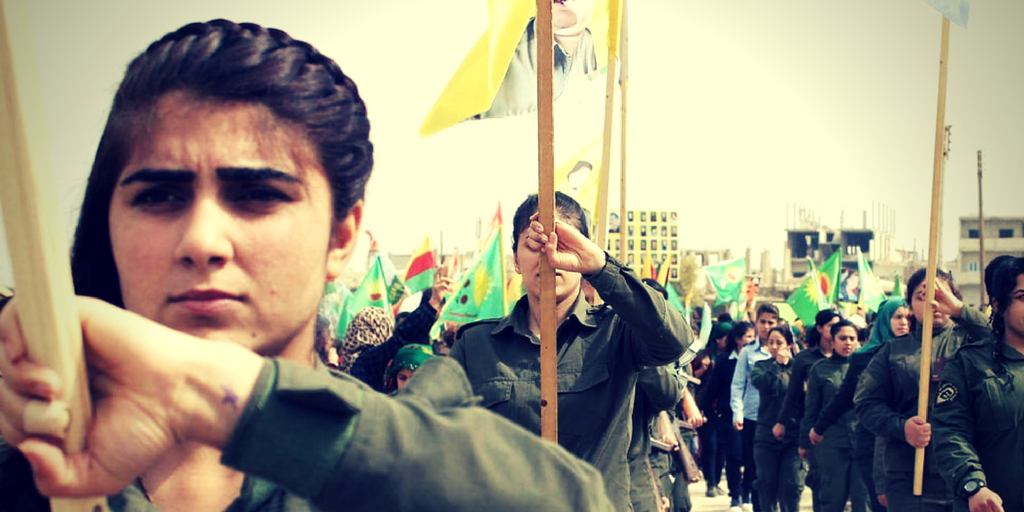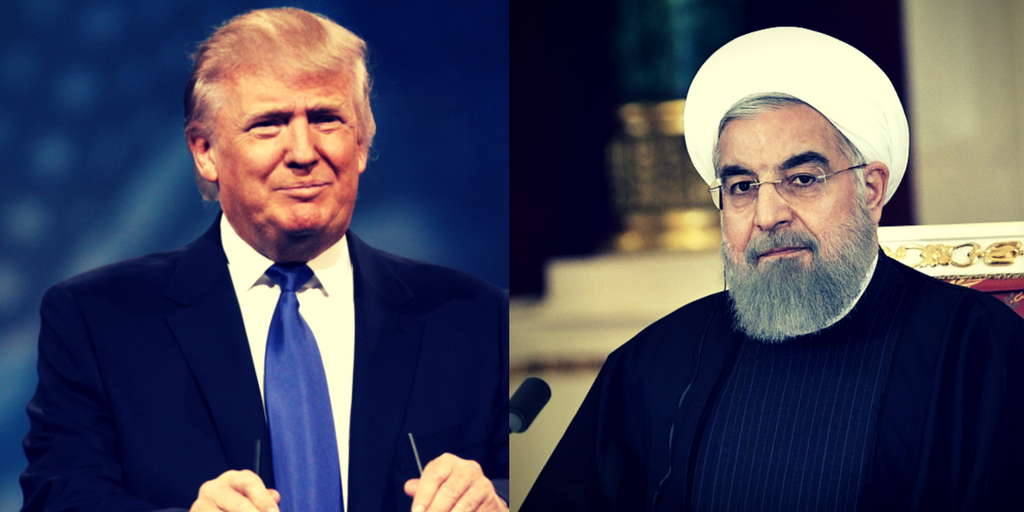President Donald Trump may about to throw the Kurds under the bus – and with them, Israel, Saudi Arabia, and American interests in the Middle East.
If concerns for securing the Pentagon budget are what convinced Trump to sign the $1.3 trillion omnibus spending bill last month, Pentagon concerns about keeping Islamist Turkey in NATO seem to be informing Trump’s thinking about abandoning the Kurds.
To the dismay of America’s allies and the delight of its enemies, President Trump declared last Thursday, in a speech in Ohio focused on infrastructure renewal, that he will soon recall U.S. forces now deployed to Syria to fight the Islamic State (or ISIS).
In his words: “We’re knocking the hell out of ISIS. We’ll be coming out of Syria, like, very soon. Let the other people take care of it now.”
On its face, Trump’s statement seems reasonable. In 2014, then-President Barack Obama received congressional authorization to deploy U.S. forces to Syria to defeat ISIS, which had seized large swathes of territory in eastern Syria and western Iraq, and had set up its so-called capital in Raqqa, Syria. But Obama’s war against ISIS was lackadaisical and inconclusive.
During the 2016 campaign, Trump pledged to obliterate ISIS. Upon taking office, he loosened the rules of engagement for U.S. forces, and devolved authority for making attacking decisions from Washington to the forces on the ground.
The results paid off. In December 2017, Iraqi President Haider al-Abadi announced that ISIS had been defeated in Iraq.
In October 2017, U.S. forces working with the predominantly Kurdish Syrian Democratic Forces defeated ISIS forces in Raqqa.
If fighting ISIS were the only reason for US forces to be in to Syria, then a reasonable argument could be made for leaving and letting “the other people take care of it [Syria] now.”
But that’s the thing, ISIS was arguably the group in Syria that constituted the smallest strategic threat to the US and its allies. Indeed, while supporting Obama’s decision, Israeli Prime Minister Benjamin Netanyahu and senior Israeli defense and military officials saidrepeatedly that Iran’s entrenchment in Syria constituted a far greater threat to the region and to global security than ISIS ever did.
Which brings us to the issue of “the other people” in Syria that Trump expects to take care of things after he removes U.S. forces.
Those “other people,” are not American allies. To the contrary.
The forces in position to take over the areas where U.S. forces are now deployed are Turkish, Iranian, and Russian. Unlike the Israelis and Saudis, the Iranians, Turks, and Russians share none of America’s interests in Syria.
Which brings us to the Kurds, who will be the immediate casualty of an American withdrawal from Syria.
The US victory against ISIS in Syria and Iraq would never have happened without the Kurdish YPG and the YPG-dominated SDF militia in Syria, nor without the Kurdish Peshmerga forces in Iraq. The Kurds were the ground forces that won the war.
Through their successful operations in Iraq and Syria, the Kurds earned U.S. support for their political aspirations for an independent Kurdistan in Iraq, and an independent Kurdish region in post-war Syria. Such independent Kurdish zones serve the larger American strategic interest of blocking Iran’s imperial aspirations. An independent Kurdistan in Iraq would block Iran from controlling the Iran-Iraq border. An independent Kurdish province in a post-war Syria would prevent Iran from controlling the Iraqi-Syrian border and thereby from gaining the capacity to extend its hegemonic reach from Tehran to Lebanon.
For the past several months, at a minimum, the Pentagon has been Turkish president Recep Erdogan’s most powerful ally in his political and military campaign against the Syrian Kurds in Washington. The Pentagon’s consistent preference for Turkey over the Kurdish forces that brought the U.S. victory against ISIS springs from its desire to keep Turkey in NATO. The U.S. directs its operations in Syria through NATO’s Incirlik Air Base in Turkey. The U.S. also stores nuclear warheads at the base.
After the failed military coup against Erdogan in July 2016, the regime cut off the power to Incirlik and effectively held the NATO personnel stationed there, including 2,700 U.S. military personnel, prisoner for several days. Rather than take the hint and make plans to remove U.S. nuclear weapons from the base and diminish American reliance on the base for NATO operations in the Middle East, the Pentagon worked to salvage U.S. relations with Turkey and Erdogan.
The argument has always been that no one wants to “lose” Turkey. But in the time that has elapsed since the failed coup, Erdogan has made clear that Turkey is already gone. In December, for example, he concluded a deal in to purchase Russia’s S-400 anti-aircraft missile defense system. The U.S. has repeatedly said that the deal is unacceptable given Turkey’s NATO membership.
Turkey has also been threatening U.S. forces in Manbij, Syria, for months, claiming the YPG forces there are terrorists aligned with the Turkish Kurdish PKK force, which the U.S. has designated a terror group.
US and Kurdish forces seized Manbij from Islamic State in 2016. Until then, the Manbij was the hub of ISIS’s supply chain from Turkey. Indeed, Manbij’s fall exposed Turkey’s key role in facilitating ISIS operations in Syria.
Turkey launched an assault against the Kurdish-controlled Afrin province along the Turkish border in western Syria in January. In the three-month operation, the U.S. provided no support for the Kurdish YPG fighters while the Russians permitted the Turks to bomb the population from the sky at will.
In mid-March, the Kurdish defenders were routed and a massive stream of refugees, including Yazidis and Christians as well as Kurds, abandoned the area to the Turks. Speaking to Reuters and other media outlets, a Kurdish spokesman said that the Turks’ aim was demographic displacement and ethnic cleansing, as fleeing Kurds, Christians, and others were replaced by Sunni Arabs and Turkmen.
Fresh on the heels of his victory in Afrin, this week Erdogan aannounced his intention to attack Kurdish PKK forces in Sinjar, Iraq. Kurdish forces in Sinjar have protected the Yazidis, who returned to the area after it was overrun by ISIS in 2014.
On March 28, Defense Secretary Mattis indicated that the U.S. supports the Turkish intention to remove the PKK forces from Sinjar.
But rather than demonstrating appreciation for the administration’s support, Erdogan is escalating his strategic embrace of Russia and Iran – at America’s expense.
On Tuesday, Erdogan will host Russian President Vladimir Putin at the Mediterranean coastal town of Akkuyu for a ceremony marking the opening of a Russian-built nuclear power plant at the site. From there, the two leaders will travel to Ankara for a trilateral summit on the future of Syria with Iranian President Hassan Rouhani on Wednesday.
If the U.S. removes its forces from Syria, Iran and Turkey can be expected to annihilate the Kurds. And, as they did in Afrin, the Russians will stand on the sidelines.
A rout of the Kurds in Syria will be an unmitigated strategic disaster for the U.S. and its allies on two levels.
First in relation to Syria itself, without the Kurds, the U.S. will have no allies on the ground. The Turks, Iranians and Russians will divide the country between them. Iran will have accomplished its goal of controlling a contiguous band of territory stretching from Iran to Lebanon. With its gains in Syria consolidated, the prospect of war between Iran and Israel on the one hand, and Iran and Saudi Arabia on the other, will rise to near-certainty.
In the event of such a war, the damage will not be limited to America’s chief strategic allies in the Middle East, which will absorb devastating losses through joint attacks by Iran and its Hezbollah, Hamas, and Iraqi proxies.
As global financial analyst and strategic commentator David Goldman notes, the prospect of a global financial shock will rise to near certainty. “When you throw a lit match into a barrel of gas, you will get a big fire,” Goldman explains.
If Iran and Saudi Arabia go to war, they will target one another’s oil installations, he explains. “The price of a barrel of oil will rise to $200. Even though the U.S. is energy independent, the global price will still rise due to supply loss, and the global economy will be shut down.” Goldman continues.
“This will be the Trump Depression,” he concludes.
In other words, the 2,000 American troops in Syria are what stand between the U.S. and a meltdown of the global economy. They prevent war in the Middle East by denying Iran the ability to consolidate its victories in Syria and to launch wars directly, or through its proxies, against Israel and Saudi Arabia.
This brings us to the second problem with Trump’s appeasement of Turkey and his intent to withdraw from Syria.
If the U.S. betrays the Kurds in Syria, it will scupper any prospect of a popular rebellion inside of Iran that can destabilize and ultimately overthrow the regime. The Iranian Kurds, like the Syrian, Turkish and Iraqi Kurds, suffer from state-sponsored discrimination and oppression. They are geographically and culturally distinct from the rest of Iran. If inspired to do so, they would play a key role in a popular uprising against the regime. Without the Kurds, it is difficult to see how such a revolution could succeed or even begin.
If the U.S. abandons the Kurds of Syria, any chance that the Iranian Kurds would rise up is gone.
In the next five weeks, Trump will decide whether to remain in Obama’s nuclear deal with Iran or to abandon it. If the U.S. remains in Syria, then a U.S. abandonment of the nuclear deal coupled with a reinstatement of significant economic sanctions against Tehran would diminish Iran’s regional standing and economic prospects. But if Trump abandons the deal and abandons Syria, the moves would likely cancel one another out.
Iran will be so empowered by a U.S. abandonment of Syria that it will likely be in a position to abandon the nuclear deal in response to a U.S. move, reinstate its high-level uranium enrichment activities, and suffer few consequences. No longer concerned about U.S. responses, many nations will make their peace with a nuclear-armed Iran and defy American sanctions.
Trump is right to wish to bring the troops home from Syria. But the price American will pay – militarily, strategically and economically — for removing U.S. forces from Syria and abandoning the Kurds will far outpace the advantages of walking away from the mess.
Indeed, the price America will pay for “losing” the already-lost Turkey will be far lower than the price the US will pay for abandoning its Kurdish allies.
Originally Published in Breitbart.





